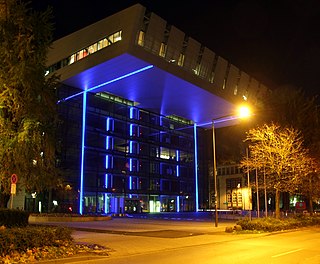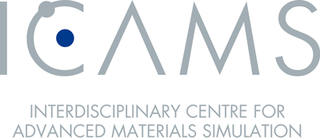
RWTH Aachen University, in German Rheinisch-Westfälische Technische Hochschule Aachen, is a German public research university located in Aachen, North Rhine-Westphalia, Germany. With more than 47,000 students enrolled in 144 study programs, it is the largest technical university in Germany.

Johannes Stark was a German physicist who was awarded the Nobel Prize in Physics in 1919 "for his discovery of the Doppler effect in canal rays and the splitting of spectral lines in electric fields". This phenomenon is known as the Stark effect.

Forschungszentrum Jülich (FZJ) is a national research institution that pursues interdisciplinary research in the fields of energy, information, and bioeconomy. It operates a broad range of research infrastructures like supercomputers, an atmospheric simulation chamber, electron microscopes, a particle accelerator, cleanrooms for nanotechnology, among other things. Current research priorities include the structural change in the Rhineland lignite-mining region, hydrogen, and quantum technologies. As a member of the Helmholtz Association with roughly 6,800 employees in ten institutes and 80 subinstitutes, Jülich is one of the largest research institutions in Europe.

The Gottfried Wilhelm Leibniz Prize, or Leibniz Prize, is awarded by the German Research Foundation to "exceptional scientists and academics for their outstanding achievements in the field of research". Since 1986, up to ten prizes have been awarded annually to individuals or research groups working at a research institution in Germany or at a German research institution abroad. It is considered the most important research award in Germany.
Karlheinz Kaske was a German manager and CEO of the Siemens AG from 1981 to 1992.
Martin Bojowald is a German physicist who now works on the faculty of the Penn State Physics Department, where he is a member of the Institute for Gravitation and the Cosmos. Prior to joining Penn State he spent several years at the Max Planck Institute for Gravitational Physics in Potsdam, Germany. He works on loop quantum gravity and physical cosmology and is credited with establishing the sub-field of loop quantum cosmology.
Ludwig Hopf was a German-Jewish theoretical physicist who made contributions to mathematics, special relativity, hydrodynamics, and aerodynamics. Early in his career he was the assistant to and a collaborator and co-author with Albert Einstein.

Walter Rogowski was a German physicist who bridged the gap between theoretical physics and applied technology in numerous areas of electronics. The Rogowski coil was named after him.
Josef Meixner was a German theoretical physicist, known for his work on the physics of deformable bodies, thermodynamics, statistical mechanics, Meixner polynomials, Meixner–Pollaczek polynomials, and spheroidal wave functions.
Walter Selke is a German retired professor for Theoretical Physics at the RWTH Aachen.

The Faculty of Mathematics, Computer science, and Natural sciences is one of nine faculties at the RWTH Aachen University. It comprises five sections for mathematics, computer science, physics, chemistry and biology. The faculty was founded in 1880 and produced several notable individuals like Arnold Sommerfeld and Nobel laureates Philipp Lenard, Wilhelm Wien, Johannes Stark or Karl Ziegler. Peter Debye studied physics at the RWTH Aachen and won the Nobel Prize in 1936. Furthermore, Helmut Zahn and his team of the Institute for textile chemistry were the first who synthesised Insulin.
Martin Beneke is a German physicist.
Knut W. Urban is a German physicist. He has been the Director of the Institute of Microstructure Research at Forschungszentrum Jülich from 1987 to 2010.

The Interdisciplinary Centre for Advanced Materials Simulation (ICAMS) is a research centre at the Ruhr University Bochum, Germany.
Josef Lutz is a German physicist and electrical engineer.
Hermann Josef Buchkremer is a German physicist and former Rector of the FH Aachen University of Applied Sciences.
Klaus-Dieter Liss, German: Liß, is a German-Australian physicist working in the field of experimental X-ray and neutron scattering and their applications. Liss research is on in-situ and real-time experiments with synchrotron and neutron radiation for the characterization of thermo-mechanical processes in metals; the investigation of phase transformations; the evolution of microstructures; and the kinetics of defects. His experimental achievements are the development of the Materials oscilloscope and the realization of the X-ray photon storage.
Wolfgang Stahl was a German spectroscopist. He was a professor at the RWTH Aachen University.
Dieter Haidt is a German physicist, known for his contribution to the 1973 discovery of weak neutral currents. The discovery was made in the Gargamelle experiment, which used a heavy liquid bubble chamber detector in operation at CERN from 1970 to 1979.







